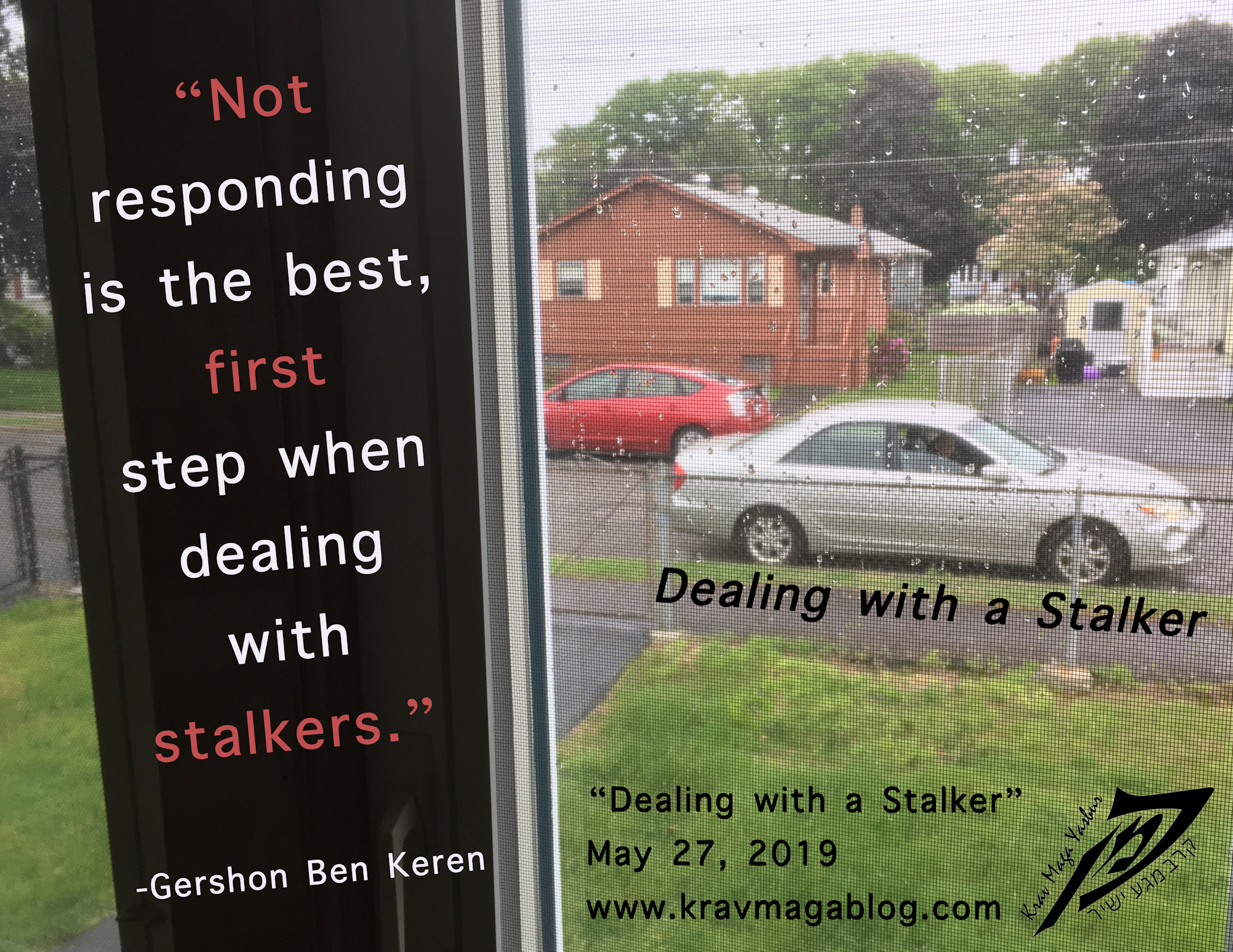Many years ago, when I was much younger, I had a stalker. Like most stalkers, it was an ex-intimate partner who couldn’t and didn’t want to accept that the relationship had ended – even though it had been a very brief one that had only lasted a couple of months. The stalking campaign lasted roughly six months, and finally ended when I moved apartments (for other reasons). At the beginning, I didn’t know much about the phenomenon of stalking, and did a lot of things wrong which fueled and perpetuated it, and it was only as I educated myself that I was able to take some of the steps, which enabled me to start taking back control of my life. At the time, my approach to dealing with aggressive behavior – which stalking is, though it may be packaged in a way where this isn’t evident – was to confront and engage i.e. what your default attitude tends to be when you’re younger and stupider. With stalkers, this is almost always the wrong response, and one which leaves you stressed, frustrated, and disempowered. Dealing with a stalker is a relentless business, and can sometimes feel like a full-time job; so I have every sympathy for anyone who is having to or has had to endure a stalking campaign. In this article, I will share some of my experiences and solutions, including those which worked and those which didn’t, in the hope that they will be of use to anyone who is going through a similar experience.
Stalkers want a relationship. In my case, the individual in question wanted to continue a relationship that had ended. It may be that initially their actions and behaviors are meant to punish you, or that they believe their constant pressure, arguments, contact, etc., will convince you to restart the relationship you ended, or it may be a mix of these things and other confused emotions. However, in most cases stalking campaigns start out with a goal. The problem is that over time, as the stalking campaign progresses, that goal gets lost, and the person simply gets caught up – and addicted – to the process of having some form of relationship with you i.e. it doesn’t matter how they are in your life, as long as they are in it, and are an all-consuming part; they want you thinking about them all the time. If 70% of your phone calls, texts and emails are from them, then every time the phone rings, you get a text, or open your email, you’re going to think it’s them, even when it’s not. This is how they stay present in your life – they know that you’ve started to associate every piece of communication with them. If there’s a knock on your door, that’s going to be them. Stalkers are resourceful. You change your number, your email, your social media accounts, they’ll find your new ones – they’ll find a pretext for asking friends and family members for your new details, etc. In the end, I kept my old phone and email account (social media wasn’t a thing at the time) and got new ones. My stalker still believed she had access to me but was using a mobile phone number that went straight to voicemail, or my home phone that went straight to an answering machine. I used to check both daily at a set time (which allowed me to control the communication) and then contact people I wanted to stay in contact with, providing them with my new number/contact details. Over time, the calls and emails started to dwindle – stalking campaigns take a lot of time and effort, and if the stalker doesn’t get any response back, there is little to feed and fuel their campaign.
I learnt the “No Communication” rule – which is the generally the best way to deal with stalkers – the hard way. Initially, I thought that if I could explain my point of view, and reason and rationalize the situation, then things would end. For me, it was obvious that receiving phone calls and emails every 20 minutes throughout the day was intrusive, annoying and unnecessary, etc., and given the chance I could explain and convince her to stop doing this. At one point I agreed to meet her, at her request, for one last time so we could clear the air and get things straight, etc. I welcomed this opportunity. We met for dinner and by the end it seemed we were on the same page – she’d even apologized. Driving back to my house, I was relieved that the ordeal was over. When I got in, I saw that the answering machine, to my old phone line was flashing. At this stage the only person who called it was her. When I played the message, it was all about how great it was that we were getting back together, that we were giving it another try, and that she accepted my apology for ending the relationship, etc. Whatever I said earlier that evening either wasn’t heard, was unconsciously re-written, or was deliberately misunderstood. Either way, it was a brilliant move to get me to “respond” to her communication, as I had to clarify that this wasn’t the case. At that moment, I was back in a “relationship” with her. It took a further three months of not responding before things started to tail off again. During this period, for about 6 weeks, she used to get on the same Tube train into London as me (I had several regular clients I trained in the city that she knew about), and sit opposite me, looking at me in silence, for the 20 minute journey – it was one of the best educations in learning to handle and become comfortable in socially awkward situations. My personal belief is that this is what really killed off the campaign i.e. not communicating and responding when she was present and appearing to be comfortable when doing so.
Not responding is the best, first step when dealing with stalkers. Many people have an initial reaction to call the police. However, unless an actual law has been broken (and most stalkers don’t cross this line), or you can provide evidence of harassment – which varies from state to state – there is little they can do. More importantly, you have responded to their communication/action, with perhaps the ultimate response, and nothing has happened i.e. you have been shown to be impotent. The key to initially coping with a stalking campaign is to start to control the communication e.g. keep your existing phone, email, etc. so they think that they can still communicate with you, but start using a new one – telling people who you want to stay in contact with, not to hand out your new number. Don’t bother to try to reason with your stalker, anybody who engages in a constant harassment campaign, is not operating rationally; and trying to enlist friends or family members to communicate – or even intimidate – on your behalf will still be seen as a “response” and evidence that the “relationship” still exists. If you’re not communicating, you’re not in the relationship.
Share:

Gershon Ben Keren
2.8K FollowersGershon Ben Keren, is a criminologist, security consultant and Krav Maga Instructor (5th Degree Black Belt) who completed his instructor training in Israel. He has written three books on Krav Maga and was a 2010 inductee into the Museum of Israeli Martial Arts.
Click here to learn more.

